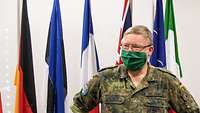A lighthouse project bridging NATONorth Atlantic Treaty Organization and EUEuropean Union
A lighthouse project bridging NATONorth Atlantic Treaty Organization and EUEuropean Union
- Date:
- Reading time:
- 3 MIN
Brigadier, Medical Corps, Dr Stefan Kowitz answers the questions of the European Parliament on the European Medical Command, one of the first PESCOPermanent Structured Cooperation (Permanent Structured Cooperation) Projects.
On 25 February 2021, the Director of the Multinational Medical Coordination Centre / European Medical Command (MMCCMultinational Medical Coordination Centre/EMCEuropean Medical Command), Brigadier, Medical Corps, Dr Stefan Kowitz, briefed the Subcommittee on Security and Defence (SEDE) of the European Parliament on the setup of this new multinational organisation. He explained the roots of the organisation originating from NATONorth Atlantic Treaty Organization and EUEuropean Union initiatives, for both of which Germany is the framework nation. One of the projects is the so-called Permanent Structured Cooperation (PESCOPermanent Structured Cooperation) with the European Medical Command. PESCOPermanent Structured Cooperation is one of the most important defence initiatives of the EUEuropean Union. Therefore, the members of the European Parliament were interested in getting an overview on the development and progress of MMCCMultinational Medical Coordination Centre/EMCEuropean Medical Command and on the integration of the PESCOPermanent Structured Cooperation project into MMCCMultinational Medical Coordination Centre/EMCEuropean Medical Command. Task of MMCCMultinational Medical Coordination Centre/EMCEuropean Medical Command is to support the medical services of NATONorth Atlantic Treaty Organization and the EUEuropean Union. The experiences made in the management of large-scale medical emergencies, the Ebola crisis and the COVID-19Coronavirus Disease 2019 pandemic have shown that the interdependencies between public health protection and external and internal security are increasing.
Multinational network as a hub for medical expertise
"In our unique position, we, the Multinational Medical Coordination Centre/European Medical Command, build bridges between civilian and military medical expertise and stakeholders of NATONorth Atlantic Treaty Organization and the EUEuropean Union as well as their nations and institutions. We are a coordinating body for military and civilian medical interoperability and the operational readiness of medical forces", the Director of MMCCMultinational Medical Coordination Centre/EMCEuropean Medical Command outlined the core mission. As demonstrated in the current COVID-19Coronavirus Disease 2019 crisis, the military medical services make an important contribution to coping with the pandemic, but serve as so-called last reserve beside the civilian main force. An essential factor for cooperation and the development of a civil-military multinational medical network concept, procurement, stockpiling and disaster relief exercises must be harmonised and be mutually complementary between the civilian and military medical services and forces wherever possible and useful. This way, improvement of the common multinational medical resilience is achieved. In this context, Brigadier Dr Kowitz mentioned DG ECHO (Directorate-General European Civil Protection and Humanitarian Aid Operations) and DG SANTE (Directorate-General for Health and Food Safety) as EUEuropean Union institutions and important points of contact for the common development of future holistic concepts.
Tangible successes during the setup
In his briefing, Dr Kowitz could also report on initial successes. For instance, MMCCMultinational Medical Coordination Centre/EMCEuropean Medical Command developed a stockpiling system for NATONorth Atlantic Treaty Organization and then extended it into a modular concept ("M3-EPS") for the reinforcement of medical treatment facilities with these modules. The aim is to be prepared more quickly and effectively for epidemic or pandemic situations, for instance by increasing intensive care capacities. The Bundeswehr applied the principle of such a medical augmentation element for intensive care units for its bilateral support in Portugal.
Another focus is the wargaming conducted at MMCCMultinational Medical Coordination Centre/EMCEuropean Medical Command. In close cooperation with the European Centre of Excellence for Countering Hybrid Threats (Hybrid CoE) and the Federal Office of Civil Protection and Disaster Assistance, MMCCMultinational Medical Coordination Centre/EMCEuropean Medical Command hosted a war game with a pandemic focus in Koblenz from 23 to 27 November 2020 ("Resilient Response 2020"). Exercise Resilient Response 2020 offered the opportunity to train necessary decision-making processes developing in the course of the different phases of a pandemic.
Functionality, interoperability, and efficiency
Central elements of the work done at MMCCMultinational Medical Coordination Centre/EMCEuropean Medical Command are the development of a medical situation picture for Europe and increasing interoperability through the further harmonisation of national medical standards. This work is supported essentially by the medical standards already applicable in the EUEuropean Union.
This year, an important highlight of MMCCMultinational Medical Coordination Centre/EMCEuropean Medical Command's efforts will be a virtual expert meeting in late May on the use of biosensors and telemedicine within the scope of medical support. MMCCMultinational Medical Coordination Centre/EMCEuropean Medical Command offers itself for bringing together national and international experts and for contributing to pooling the wide range of activities. In addition, potential ethical questions and requirements of the regulation on medical equipment associated with the use of this technology shall be analysed within the scope of this workshop.




